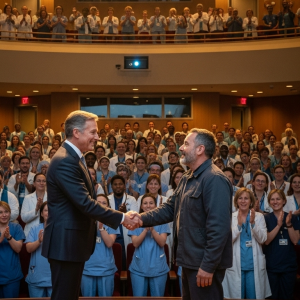The ghost of a Thanksgiving turkey, rich with sage and thyme, already haunted their car, a stark contrast to the sterile, antiseptic smell of the clinic that still clung to Grace’s clothes. In her purse, nestled beside her wallet, was a secret. It wasn’t just a piece of paper; it was a photograph, a grainy black-and-white image of a dream she had almost given up on. A tiny flicker of life.
David drove, his knuckles white on the steering wheel. He had that familiar look on his face—a tight, strained smile that never reached his eyes. It was the same look he wore every time they left a fertility specialist, every time a new treatment failed, every time his mother called. He thought she didn’t notice, but after seven years, Grace had become an expert in the unspoken language of his fear.
“Are you okay?” she asked softly, her voice a gentle probe into his silence. “You seem… tense.”
“Just thinking about the traffic,” he lied, his eyes fixed on the road. “And you know how Mom gets on Thanksgiving. I just want everything to be perfect. For you.” The lie was so practiced, so smooth, it slid between them like a pane of cold glass. For years, his excuses had been her reality. “I’m swamped at work, honey, I can’t make the appointment.” “You’re so much stronger with this stuff than I am.” “Just tell me what the doctor says.” He had let her face every needle, every invasive procedure, every crushing disappointment, alone.
Grace simply nodded, her hand instinctively going to her purse. The little photograph inside felt like a shield. Today, she wasn’t just bringing a casserole to dinner; she was bringing the truth. A truth so monumental it would either rebuild their world or shatter it into a million irreparable pieces. She wasn’t sure which outcome she feared more.
Margaret’s home was a museum of a life perfectly curated. The silverware gleamed under the warm light of the chandelier, the crystal glasses stood like soldiers on the crisp linen tablecloth, and the air was thick with the scent of pine from the perfectly arranged centerpiece. It was a house built on appearances, a shrine to the Sterling family name—a name Margaret was pathologically obsessed with continuing.
“Grace, dear,” Margaret chirped, her smile a slash of crimson lipstick. She took the casserole from Grace’s hands without making eye contact. “You look a little pale. Are you feeling alright? You must take better care of yourself. Stress is so detrimental.” Every word of concern was a thinly veiled accusation, another small cut in a death by a thousand cuts.
The dinner conversation was a minefield. Margaret steered every topic back to family, to legacy, to grandchildren. She regaled the table with stories of David’s perfect childhood, his athletic trophies, his academic achievements. He was her perfect son, the flawless heir to a non-existent throne, and Grace was the only blemish on his otherwise perfect lineage.
David sat beside Grace, a silent accomplice. He would laugh at his mother’s jokes, add a fond anecdote here and there, but never, not once, did he defend his wife. He just refilled her water glass, his hand trembling slightly, avoiding her gaze as if it might burn him. Grace watched him, a cold knot of clarity forming in her stomach. It wasn’t just weakness; it was guilt. A guilt so profound he couldn’t even look at the woman he had wronged.
She remembered how quickly he had agreed to the anonymous donor. After years of her enduring painful and expensive treatments, he had acquiesced with an almost casual relief. “Sure, honey,” he had said, staring at the TV. “Let’s give it a shot. We should try everything, right?” It wasn’t the desperation of a man willing to try anything; it was the easy consent of a man who already knew the answer. He was just letting her play out the final, painful act of a charade he had been directing for over a decade.
As dessert was served—a pumpkin pie that looked like it belonged on a magazine cover—Margaret tapped her crystal glass with a fork. The ringing sound cut through the low hum of chatter, instantly commanding the attention of the entire family. A predatory smile played on her lips. This was her stage.
“If I could have everyone’s attention,” she began, her voice dripping with a cloying, false sweetness. She rose to her feet, a matriarch about to deliver a decree. David stiffened beside Grace, his fork frozen halfway to his mouth. He knew. He knew what was coming.
“As we gather here on this day of thanks,” Margaret continued, her eyes sweeping over the family before landing, with surgical precision, on Grace. “I think it’s important to acknowledge not just our blessings, but our struggles. The burdens we carry with brave faces.”
A heavy silence fell over the room. Grace could feel the weight of a dozen pairs of eyes on her—pitying, curious, invasive. She felt like an exhibit in a zoo, the strange creature who could not perform the one simple trick required of her.
Margaret let the silence hang in the air, savoring the moment. “I have some sad news to share,” she announced, her voice a perfect imitation of sympathy. “It is with a heavy heart that we have come to accept the truth. After many years of trying, and much difficulty, we have learned that my dear daughter-in-law, Grace… is unable to give David a child.”
The words were a physical blow. The air rushed from Grace’s lungs. Across the table, David’s face was ashen, his eyes glued to his plate. He didn’t move. He didn’t speak. He didn’t defend her. He just sat there, letting his mother’s lie become the definitive history of their marriage.
For a heartbeat, Grace allowed the crushing silence to envelop her. She saw the pity in her sister-in-law’s eyes, the awkward discomfort on her uncle’s face. This was her sentence, delivered publicly by her executioner. But then, a quiet strength, born of months of secret knowledge and years of silent suffering, rose within her.
Slowly, Grace placed her napkin on the table and stood up. Her movements were calm, deliberate. She gently placed a hand over her abdomen, a simple gesture that was a declaration of war.
“Actually, Margaret,” she said, her voice clear and steady, cutting through the thick, uncomfortable air. “That’s not quite right. I just came from my first ultrasound this morning.” She paused, letting her words sink in, and then delivered the first shockwave. “I’m pregnant.”
A collective gasp went through the room. David’s head snapped up, his eyes wide with a mixture of terror and disbelief. Whispers erupted around the table. Margaret’s perfectly painted smile faltered, her face contorting for a fraction of a second in pure shock before she regained her composure.

The older woman let out a short, sharp laugh. “Pregnant?” she sneered, her voice dripping with insinuation. “Oh, my. What a surprise. Well, modern medicine is truly a miracle, isn’t it? Or… perhaps, it’s something else entirely.” The accusation was unmistakable, a poisoned dart aimed directly at Grace’s honor, painting her as an adulteress in front of her entire family.
That was it. The final betrayal. Not just from Margaret, but from David, whose continued silence was a deafening confession. A cold fire ignited in Grace’s veins. She turned her gaze from her mother-in-law to her husband, who was now visibly trembling.
“You’re right about one thing, Margaret. It wasn’t a miracle,” Grace said, her voice dropping to a dangerously quiet, icy tone. The entire room held its breath. “And while we’re sharing truths at this lovely Thanksgiving dinner, perhaps you should know what else I discovered at the clinic today.”
She never took her eyes off David’s terrified face. His world was collapsing in slow motion, and he knew it.
“David,” she said, her voice echoing in the dead silence. “Why don’t you tell your mother why we had to use a donor? Why don’t you tell her about your medical records? The ones from when you were seventeen. The ones from the same hospital, detailing the permanent damage from your bout with the mumps.”
A fork clattered onto a plate, the sound as loud as a gunshot.
“Why don’t you tell her the truth you’ve been hiding for fifteen years?”
The silence that followed was absolute, a vacuum where a family used to be. Every eye was now fixed on David, a man suddenly stripped bare in the harsh glare of a truth he had spent his adult life burying. His face, already pale, had turned a ghastly shade of white. His mouth opened and closed, but no sound came out.
Margaret was the first to break. “What… what is this nonsense?” she stammered, looking from Grace’s stony face to her son’s unraveling one. “David? Tell her she’s lying. Tell her this is a vicious, horrible lie!” Her voice was shrill, desperate. The foundation of her world—the perfection of her son, the purity of her bloodline—was cracking beneath her feet.
David finally looked at Grace, and in his eyes, she saw not just fear, but a hollowed-out cavern of shame. He couldn’t hold her gaze. He looked down at his hands, and with a voice that was barely a whisper, a choked, broken sound, he confessed. “It’s true.”
Two words. Two words that detonated the entire structure of their lives.
“It’s true, Mom,” he repeated, his voice cracking. He finally looked at his mother, tears streaming down his face. “I couldn’t… I couldn’t tell you. I couldn’t tell anyone. I was so ashamed.” The confession tumbled out of him now, a torrent of buried pain and deceit. He admitted to letting Grace endure years of treatments he knew were pointless. He admitted to letting his own mother vilify his wife to protect his fragile ego.
Margaret stared at her son, her face a mask of horror and disbelief. She wasn’t just wrong; she was a fool. A cruel fool who had tormented an innocent woman while being completely blind to the truth of her own son. The social and familial standing she had built her entire identity upon crumbled into dust. She sank back into her chair, looking old and defeated.
Grace watched the demolition. She felt no triumph, only a vast, empty sorrow. The man she had loved had been a stranger. Their marriage, a lie. Without another word, she picked up her purse and walked out of the house, leaving the ruins of the Sterling family behind her. The slam of the front door was the only sound.
The weeks that followed were a blur of hollow days and sleepless nights. David’s apologies were relentless—tearful phone calls, desperate text messages, letters left on her doorstep. But Grace knew that apologies were just words. The real work was in rebuilding the man, not just the marriage.
She agreed to meet him in one place: a therapist’s office. The room was neutral territory, a safe space to dissect the wreckage. In those sterile, quiet sessions, the full story emerged. David spoke of the crushing shame he felt as a teenager, of his father’s relentless pressure to be a “strong man,” and of a fear so deep it had paralyzed him for fifteen years.
“I saw how much Mom’s approval meant,” David explained to the therapist, his voice raw. “And her obsession with the ‘Sterling heir’… I thought if she knew the truth about me, she would see me as… less than. Broken. And I let that fear poison everything. I let it hurt the one person I truly loved.” He looked at Grace, his eyes pleading. “I let it hurt you.”
It was a long and arduous process. Grace forced him to confront every lie, every moment of cowardice. There were sessions filled with rage and tears, and sessions of heavy, impenetrable silence. But slowly, a change began. David stopped making excuses and started taking responsibility.
The true turning point came three months later. Margaret, after a long silence, called David, her voice attempting its old, manipulative charm, suggesting a family dinner to “put all this ugliness behind us.” The old David would have agreed. But this David was different.
“No, Mom,” he said calmly, but with a new firmness in his voice. Grace, listening from the other room, held her breath. “There will be no dinner. Not until you call Grace and give her the sincere, unconditional apology she has deserved for seven years. Until you do that, you and I have nothing to talk about.” He ended the call. It was the first time in his life he had ever stood up to her.
Nine months after that catastrophic Thanksgiving, Grace gave birth to a healthy baby boy. They named him Noah. In the quiet, brightly lit hospital room, David held his son for the first time, his face a landscape of awe and profound, tearful gratitude. He looked over at Grace, who was watching him, her expression soft.
Their journey was far from over. Trust, once shattered so completely, had to be rebuilt piece by piece, day by day. There were still moments of doubt, echoes of the past that threatened to pull them under. But now, they had a new foundation to build upon—one of brutal, painful, and ultimately, liberating honesty.
“He has your eyes,” Grace whispered, her voice tired but content.
David looked from Noah’s face to hers, a genuine, unburdened smile finally reaching his eyes. “No,” he said softly. “He has your strength.”
Grace had won more than just her honor back. She had exposed a lie and, in doing so, had given her husband the chance to become the man he was always meant to be. Holding her son, watching her husband, she knew this was her true victory. It wasn’t just a new child; it was a new beginning, a family forged not in a perfect lineage, but in the imperfect, resilient, and beautiful power of truth.




